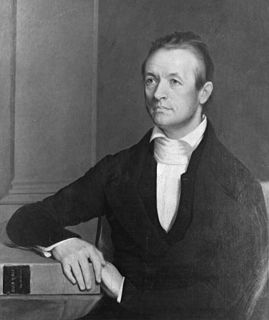A Quote by William Blake
He who loves his enemies betrays his friends; this surely is not what Jesus meant.
Related Quotes
But they all stood beneath the cross, enemies and believers, doubters and cowards, revilers and devoted followers. His prayer, in that hour, and his forgiveness, was meant for them all, and for all their sins. The mercy and love of God are at work even in the midst of his enemies. It is the same Jesus Christ, who of his grace calls us to follow him, and whose grace saves the murderer who mocks him on the cross in his last hour.
How admirable and beautiful is the simplicity of the Evangelists! They never speak injuriously of the enemies of Jesus Christ, of His judges, nor of His executioners. They report the facts without a single reflection. They comment neither on their Master's mildness when He was smitten, nor on His constancy in the hour of His ignominious death, which they thus describe: "And they crucified Jesus.
To accept Christ is to know the meaning of the words 'as he is, so are we in this world.' We accept his friends as our friends, his enemies as our enemies, his ways as our ways, his rejection as our rejection, his cross as our cross, his life as our life and his future as our future. If this is what we mean when we advise the seeker to accept Christ, we had better explain it to him. He may get into deep spiritual trouble unless we do.
I'm from Oklahoma City, and there's a statue across from the site of the Alfred P. Murrah Federal Building of Jesus. It's called 'Jesus Wept.' And I love this statue because it's a statue of Jesus with his head in his hand. And his sadness and his pain at some of the choices that are made here - that just breaks his heart.
When I look at Jesus' warm and intimate friendships, my heart fills with praise that Jesus was. . . a man. A man of flesh-and-blood reality. His heart felt the sting of sympathy. His eyes glowed with tenderness. His arms embraced. His lips smiled. His hands touched. Jesus was male! Jesus invites us to relate to him as the Son of Man. And because he is fully man, we can relate to Jesus with affection and love.
If man had his way, the plan of redemption would be an endless and bloody conflict. In reality, salvation was bought not by Jesus fist, but by His nail-pierced hands; not by muscle but by love; not by vengeance but by forgiveness; not by force but by sacrifice. Jesus Christ our Lord surrendered in order that He might win; He destroyed His enemies by dying for them and conquered death by allowing death to conquer Him.






































